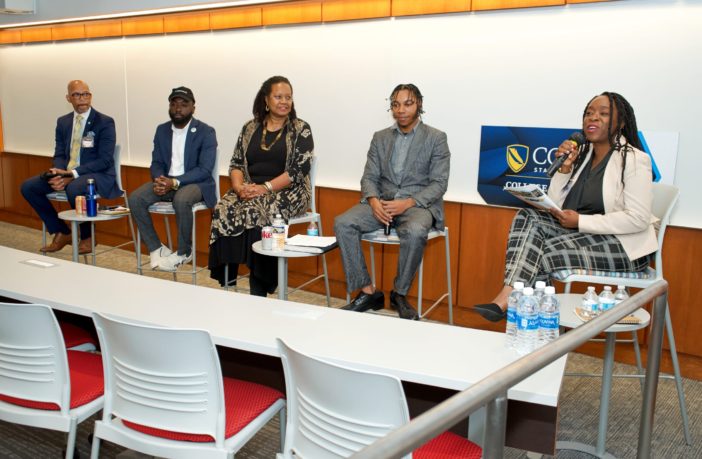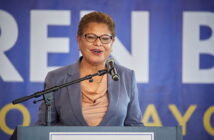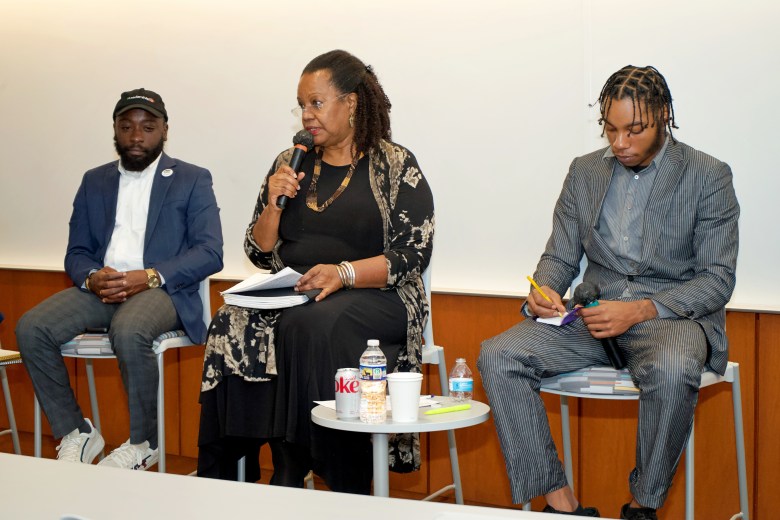
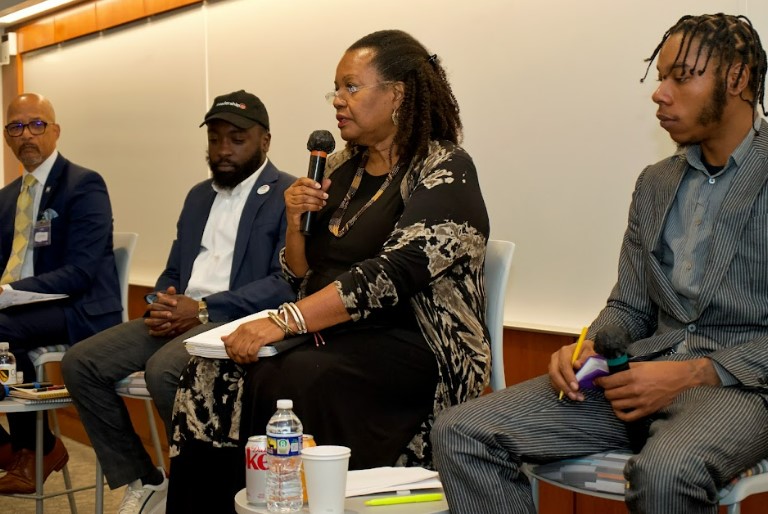
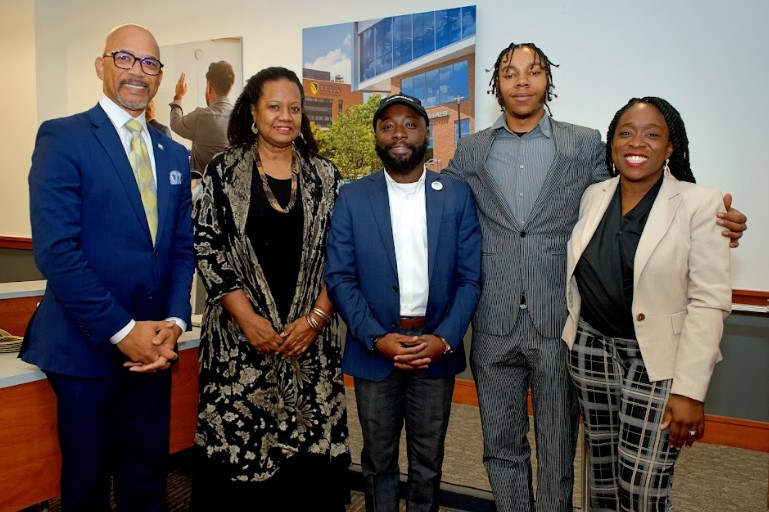
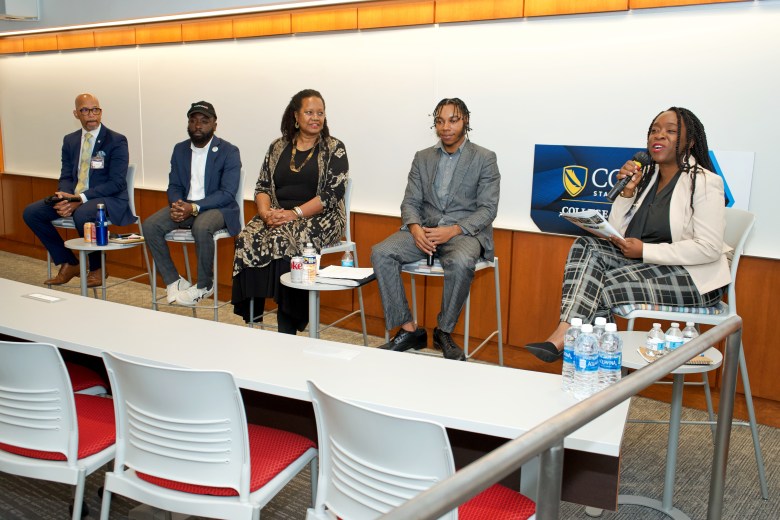 Panelists discuss the Excel Project, a collaborative research initiative between Coppin State University (CSU) and the Baltimore Development Corp. that aims to identify and nurture young entrepreneurs. From left to right: Ron Williams, director of CSU’s Center for Strategic Entrepreneurship and principal investigator of the EXCEL Project; Rashad Staton, executive director of Community Law In Action and a participant in the EXCEL Project; Claudia Thorne, assistant professor in CSU’s Department of Social Work and member of the EXCEL research team; Omani Placide, a young entrepreneur and EXCEL Project Advisory Board member and Hennither Gant, moderator, owner of Career Image Solutions and a Coppin alumna. (Photo by Reuben Greene)
Panelists discuss the Excel Project, a collaborative research initiative between Coppin State University (CSU) and the Baltimore Development Corp. that aims to identify and nurture young entrepreneurs. From left to right: Ron Williams, director of CSU’s Center for Strategic Entrepreneurship and principal investigator of the EXCEL Project; Rashad Staton, executive director of Community Law In Action and a participant in the EXCEL Project; Claudia Thorne, assistant professor in CSU’s Department of Social Work and member of the EXCEL research team; Omani Placide, a young entrepreneur and EXCEL Project Advisory Board member and Hennither Gant, moderator, owner of Career Image Solutions and a Coppin alumna. (Photo by Reuben Greene)
By Reuben Greene,
Special to the AFRO
The Baltimore Development Corp. (BDC) recently concluded the Baltimore Together Summit 2023, a weeklong event dedicated to reviewing Baltimore City’s Comprehensive Economic Development Strategy (CEDS).
One of the key highlights of the summit was the discussion surrounding the (EXCEL) Research Project and youth entrepreneurship training. The EXCEL Project is a collaborative research initiative between Coppin State University (CSU) and the Baltimore Development Corp. The project aims to identify and nurture entrepreneurial talent in Baltimore City, particularly among young individuals.
On Nov. 2, investors, business owners and representatives of youth advocacy groups gathered at CSU’s College of Business for a panel discussion. The participants on the panel were: moderator, Hennither Gant, Career Image Solutions; Dr. Claudia Thorne, assistant professor in CSU’s Department of Social Work and member of the EXCEL research team; Omani Placide, a young entrepreneur and EXCEL Project Advisory Board member; Ron Williams, director of CSU’s Center for Strategic Entrepreneurship and principal investigator of the EXCEL Project; and Rashad Staton, executive director of Community Law In Action and a participant in the EXCEL Project.
Here is a cross-section of the questions and answers of the moderator and panelists:
Moderator Gant: “Some of the programming offered educates youth ages 14-24. What are some of the challenges that young people experience when transitioning into adulthood?”
Rashad Staton: “The connectivity that we have today is important. We have the pillars of leadership advocacy but also strength based approaches and connecting young people to their own self defined success. That’s what brought us to the work of entrepreneurship. That’s what makes the EXCEL Project work.”
Moderator Gant: “What is the interest or rationale behind this work considering that this is a higher education institution. What’s the connection?”
Ron Williams: ”Our greatest value at CSU is that we are trust brokers and are very community-facing. We have been doing this work for 123 years. We have been engaging Black residents, providing value and business education. Regardless of what they’ve brought to the table, we’ve been able to help them acquire what was necessary to compete in the marketplace.”
“Research is about identifying best practices within the program but we also want to improve the research process. Teaching, research and service – those are the pillars of academic production.”
Moderator Gant (to Omani Placide, the youngest member of the panel): “As leaders, what can we do to empower young entrepreneurs of today?”
Omani Placide: “Education, free resources, mentorship, less gate-keeping, advocacy, representation, inclusiveness, networking and equipment. These are all ways to empower young entrepreneurs and impoverished communities. Bridging the gap is key.”
Moderator Gant: “What are some of the early themes that you’ve found while researching the EXCEL data?”
Dr. Claudia Thorne: “Our approach to data collection is most significant. It is one of applied community action and applied research. We are having conversations with entrepreneurial and youth leaders, finding out what they are doing, how they are doing it and what is the impact.
“What’s really fundamental throughout these programs is that funds are channeled directly to the youth. The retention rate of a lot of the programs are between 80 to 86 percent, which speaks volumes.”
Following the panel discussion, attendee DeJuan Patterson, of the Bridge Advisory Group, provided his feedback to the AFRO.
“Today, I witnessed the love for Baltimore’s youth,” Patterson said. It’s great to see entrepreneurship being elevated. These conversations are necessary and lead to a viable pathway for development within our communities.”
He added, “During the discussion, I’ve learned that there has been an increase in value for institutional investment and entrepreneurial education. This level of investment and research taking place across the communities of Baltimore is much needed.”
The Baltimore TogetherSummit 2023 concluded with a strong commitment from the participants and stakeholders to continue working together to implement the strategies discussed during the event. By focusing on youth entrepreneurship and supporting the EXCEL Project, Baltimore City aims to nurture the next generation of innovators and business leaders, ultimately contributing to the city’s economic growth and prosperity.
